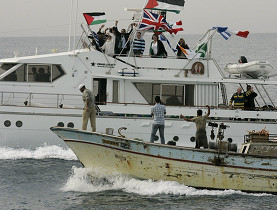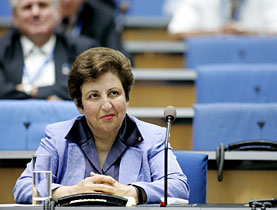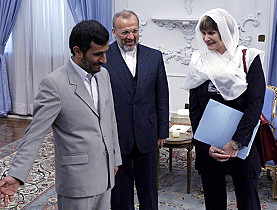No end to Middle East “three-sided poker game”

Switzerland has again spoken out on the situation in the Middle East, drawing attention to the deteriorating situation in the Palestinian Territories.
In an address to the UN General Assembly in New York on Tuesday night, ambassador Peter Maurer also mentioned signs of hope: positive political developments in Lebanon and indirect peace talks between Syria and Israel.
Maurer’s statement marked the third time since the beginning of November that the government has broached the conflict. But Middle East expert Erich Gysling tells swissinfo that Switzerland is too small an actor to play a key role in bringing peace to the region.
It’s not for a lack of trying: the country’s recent comments coincide with the fifth anniversary of the Geneva Accord, a peace framework between Israelis and Palestinians.
Championed by Foreign Minister Micheline Calmy-Rey, it among other things spelled out an end to hostilities, the creation of two separate states and international oversight.
The major stumbling block, however, is that neither government has any intention of agreeing to it.
Gysling says grassroots support for peace is important but stresses high-level cooperation and good faith are essential.
swissinfo: Switzerland seems to have ratcheted up its discussion of Israel and the Palestinians recently. What’s behind this?
Erich Gysling: Switzerland tries. Not to mediate – we are too small to mediate – but Switzerland tries to keep the channels for conversation as open as possible between Israel as well as the Palestinians.
Of course, it’s always a difficult situation because on the one hand, Swiss authorities are sort of sceptical regarding [the extremist group] Hamas. But everybody knows that in the long run, Hamas cannot be left out of the dialogue.
So it’s like a three-sided poker game: Israel on the one side, Fatah [the major Palestinian political party] and Hamas.
The real question will be if Israel will stop its activities regarding settlements in the West Bank. If they are not going to stop them, all these words and all these intentions don’t lead to anything.
swissinfo: How much influence does Switzerland actually have in the region?
E.G.: It’s a very small influence. We must be honest about that. And the Israelis are rather sceptical about Switzerland’s tactics in the Middle East. The Israelis time and again repeat that the Swiss foreign minister did the wrong thing in signing this gas deal with Iran, for instance.
Whenever Switzerland tries in international meetings to give sort of an impartial vote also giving consideration to the desires and requirements of Palestinians, Israel is quite quick to say it’s a one-sided position.
So there is mistrust from the Israeli official side regarding Swiss policy and tactics in the Middle East.
swissinfo: Some critics have accused Switzerland – and Micheline Calmy-Rey in particular – of abandoning the country’s neutrality. What meaning does a word like “neutral” actually have in a context like this?
E.G.: It means absolutely nothing. Switzerland has relations and a dialogue with both sides. If the Israelis are hinting at the attitude of Switzerland regarding Iran, Switzerland did not counteract the UN resolutions regarding Iran.
swissinfo: The Geneva Accord, championed by Calmy-Rey, speaks of “historic reconciliation”. The reality on the ground is in many aspects very different. Is the idea dead in the water?
E.G.: It’s hard to say. In the early 1990s, we had the same impression and then came this sort of breakthrough with the Oslo peace agreement of 1993.
Both sides said to leave open certain difficult questions and see how the atmosphere changes at the grassroots level.
As we all know, Oslo failed after seven years, but for seven years, there was hope. Today, there is almost no hope at all. This is what I would say makes it so frustrating.
Things have to start on a higher level: stop building Jewish settlements in the Palestinian areas and stop the terrorist attacks from Gaza.
swissinfo: The people we today call Palestinians lived under occupation for centuries – under the Ottomans, the Egyptians and the British before the middle of the 20th century. Is it realistic to expect a Palestinian state in the near future?
E.G.: If we look at the map right now, what we have is small territories [of Jewish settlers] to a small extent representing the same settlements as in South Africa during the Apartheid regime.
So it’s an illusion to say that if everything stops right now and then you have the possibility of building a Palestinian state – part of it in the West Bank, part in the Gaza Strip.
swissinfo: Would an independent Palestine be democratic and pluralistic?
E.G.: It’s hard to say. What we have to acknowledge is that Hamas was elected by a majority of Palestinians in Gaza and it got a large minority of votes in the West Bank. This is a fact, at least for the time being. What would be the outcome after two or three or five years, nobody knows.
I’d guess it would follow more or less the same pattern of political development – frustrating those who really want democracy and pluralism in the area. I can’t see it would behave much different than other Arab states or Arab political systems.
swissinfo: Are the Palestinians prepared at this point to govern and to run a well-functioning state?
E.G.: You have more than enough bureaucrats. The bureaucracy in the Palestinian bureaucracy is tremendous… If you compare the number of people they employ in the police service and so on compared with the population.
The other question is who is ready to build up a government without corruption. There, Hamas seems to be much better than the groups around [Fatah leader] Mahmoud Abbas. But it has not yet been tested. The state is an illusion.
swissinfo-interview: Justin Häne
In 2003, the Israeli administration of Arial Sharon rebuked leftwing political figures that had participated in the Geneva Initiative.
Today about of half of people on both sides think it’s a good idea.
The accord’s principles are:
End of conflict. End of all claims.
Mutual recognition of Israeli and Palestinian rights to two separate states.
A final, agreed upon border.
A comprehensive solution to the refugee problem.
Large settlement blocks and most of the settlers are annexed to Israel, as part of a 1:1 land swap.
Recognition of the Jewish neighbourhoods in Jerusalem as the Israeli capital and recognition of the Arab neighbourhoods of Jerusalem as the Palestinian capital.
A demilitarized Palestinian state.
A comprehensive and complete Palestinian commitment to fighting terrorism and incitement.
An international verification group to oversee implementation.
Erich Gysling spent 25 years working with the Swiss Broadcasting Corporation as a journalist, commentator and executive.
He was the chief of the foreign editorial staff for the Weltwoche magazine from 1972 to 1982.
Gysling studied cultural history in Vienna and has authored three books on the Arab world.

In compliance with the JTI standards
More: SWI swissinfo.ch certified by the Journalism Trust Initiative



You can find an overview of ongoing debates with our journalists here. Please join us!
If you want to start a conversation about a topic raised in this article or want to report factual errors, email us at english@swissinfo.ch.